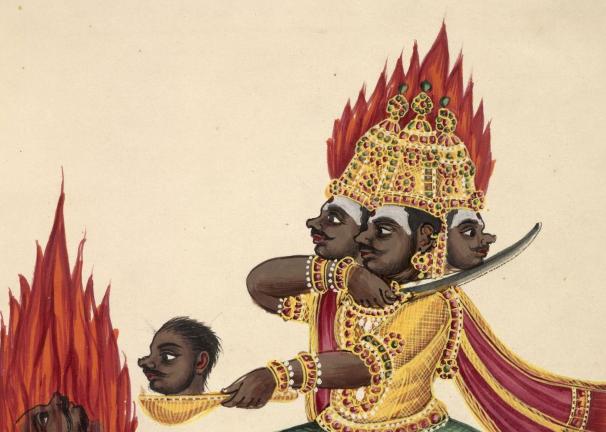Many people – perhaps most – believe in some kind of “soul” or “spirit”. The soul is the human personality that survives the body after death, perhaps to walk this world as a ghost or a friendly presence, perhaps to reincarnate, perhaps to find reward or punishment in another dimension.
The psychologist Carl Jung noted that the sense of “the autonomy of the soul-complex” tends to lead to assumptions that the soul is separate, invisible and immortal. Yet while this general impression is commonly held, it nevertheless sounds foolish to make specific claims about this invisible world beyond space and time. People are happy to believe that they have souls, but as soon as the activity of the soul must be defined, in ways that are inevitably culturally specific, it becomes ridiculous. “That there are manes, a subterranean kingdom, a ferryman with a long pole, and black frogs in the whirlpools of the Styx; that so many thousand men could cross the waves in a single boat,” the Roman poet Juvenal said incredulously, “to-day even children refuse to believe.”
Just what is the soul? Is it somehow tangible (if not exactly physical material) or is it, on the other extreme, an elaborate metaphor or story?
How to study it
If the soul were a material object or part of the physical body, scientists could study it. But as it is generally believed to be a substance separate from the physical world, it cannot be seen, heard, weighed or otherwise measured. To get around this problem, some people describe the physical body in spiritual terms.
One might reasonably believe that certain organs, like the brain or heart, are especially important to what people generally perceive as the sacred or deeply meaningful status of human life. In her book “Stiff: The Curious Lives of Human Cadavers,” Mary Roach reported that, when she asked heart surgeon Mehmet Oz where he thought the soul was, he said he didn’t believe it was “all in the brain.” Instead, he said, “I have to believe that in many ways the core of our existence is in our heart,” and he clarified, “There’s no question that the heart without a brain is of no value. But life and death is not a binary system.”
 Decentralizing the definition of biological life and perhaps spiritual life and allowing it to be determined by the functioning of multiple organs or systems – and likely also by some mental state or behavior – admits that people can be alive in different ways. These differences can be meaningfully studied, not only for the clinical task of determining the exact moment when human life begins and ends, but also to move beyond that sort of binary thinking and to consider what it feels like and what it means to be alive or to be dead.
Decentralizing the definition of biological life and perhaps spiritual life and allowing it to be determined by the functioning of multiple organs or systems – and likely also by some mental state or behavior – admits that people can be alive in different ways. These differences can be meaningfully studied, not only for the clinical task of determining the exact moment when human life begins and ends, but also to move beyond that sort of binary thinking and to consider what it feels like and what it means to be alive or to be dead.
The soul may have multiple components
One doesn’t have to be a doctor or scientist to see the complexity of the status of being alive and feeling. Some cultures, too, traditionally acknowledge that there are different kinds of souls.
Deepak Chopra wrote in “How to Know God“:
“In India the soul has two parts. One is called Jiva, which corresponds to the individual soul making its long journey through many lifetimes until it reaches full realization of God….The second half of the soul, called Atman, does not accompany us on any journey….in fact, the worst criminal and the holiest saint have the same quality of soul when it is this aspect that is in question.”
Daniel Dennett wrote in “Breaking the Spell: Religion as a Natural Phenomenon”:
“The Jivaro of Ecuador believe that you have three souls, the true soul you have from birth (it returns to your birthplace when you die, then turns into a demon, which dies in turn, becoming a giant moth, which becomes mist when it dies); the arutam, a soul you obtain by fasting, bathing in a waterfall, and partaking of hallucinogenic juice (it makes you invincible but has the unfortunate habit of leaving you when you’re in a jam); and the musiak, the avenging soul which tries to escape a victim’s head and kill the victim’s murderer. This is why you must shrink the head of your victim…”
These mythological distinctions reveal that the idea of the soul serves multiple functions. To restate the above, the soul can be the elevated lifelong quest for spiritual enlightenment (jiva); the bare life that is more or less equal in everything that breathes (atman); the groundedness in one’s ancestral homeland; the evanescent ecstasy that comes with religious ritual (arutam); and the moral passions (musiak). There is no apparent reason why a person should not be able to have more than one of these souls.
Becoming immortal
In the quest for immortality, said mythologian, Joseph Campbell, in “The Hero with a Thousand Faces,” “the basic problem is: to enlarge the pupil of the eye, so that the body with its attendant personality will no longer obstruct the view. Immortality is then experienced as a present fact: ‘It is here! It is here!'” Campbell intends his instruction “enlarge the pupil of the eye” to be taken metaphorically. He means that seeking abundant life is not about forcing the same body to go on forever and ever, but rather to learn to perceive more of the world from a wider perspective, such that one is less disheartened by the thought of the body’s physical death and can interpret oneself first and foremost as part of the world, and only secondarily as a separate being who must die.
 Another way in which a person can be said to live forever is through the memories of others. Ideally, this is because the deceased person has left a positive legacy that others have reason to keep in their conscious memory.
Another way in which a person can be said to live forever is through the memories of others. Ideally, this is because the deceased person has left a positive legacy that others have reason to keep in their conscious memory.
If a memory of a dead person is especially strong, such that the mourner nearly believes that they can bring the dead person back, psychologists often refer to it as “magical thinking.” A brief passage in S. E. Hinton’s novel “The Outsiders” conveys this effectively:
“Johnny was dead. But he wasn’t. That still body back in the hospital wasn’t Johnny. Johnny was somewhere else — maybe asleep in the lot, or playing the pinball machine in the bowling alley, or sitting on the back steps of the church in Windrixville. I’d go home and walk by the lot, and Johnny would be sitting on the curb smoking a cigarette, and maybe we’d lie on our backs and watch the stars. He isn’t dead, I said to myself. He isn’t dead. And this time my dreaming worked. I convinced myself that he wasn’t dead.”
No one aspires to be Johnny in this situation, but some people maybe aspire to be the one who remembers Johnny. The bond that a mourner feels with the dead person testifies to the power of the imagination and the endurance of human relationships. In that sense, the mourner may be said to enrich his own soul by mourning for Johnny; it may also be suggested that the mourner gains Johnny’s soul, too, keeping it alive through memory.
What is the soul?
The soul can have many definitions. It can be one (or several) of many things. The definition of immortality cannot be pinned down, either. It may mean different things for different people.
If one does not believe that the soul is part of the body or otherwise has tangible effects, then whether the soul “really exists” depends on whether one believes that there is a realm of non-material spirits or on whether one considers myths to have “reality” in human life.
If there is a fact of the matter about the afterlife, it may still be the case that the afterlife is different for each person, just as life on Earth is different for each person.






